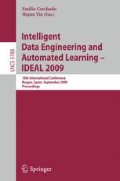Abstract
Recently, building sparse SVMs becomes an active research topic due to its potential applications in large scale data mining tasks. One of the most popular approaches to building sparse SVMs is to select a small subset of training samples and employ them as the support vectors. In this paper, we explain that selecting the support vectors is equivalent to selecting a number of columns from the kernel matrix, and is equivalent to selecting a subset of features in the feature selection domain. Hence, we propose to use an effective feature selection algorithm, namely the Minimum Redundancy – Maximum Relevance (MRMR) algorithm to solve the support vector selection problem. MRMR algorithm was then compared to two existing methods, namely back-fitting (BF) and pre-fitting (PF) algorithms. Preliminary results showed that MRMR generally outperformed BF algorithm while it was inferior to PF algorithm, in terms of generalization performance. However, the MRMR approach was extremely efficient and significantly faster than the two compared algorithms.
Access this chapter
Tax calculation will be finalised at checkout
Purchases are for personal use only
Preview
Unable to display preview. Download preview PDF.
References
Shawe-Taylor, J., Cristianini, N.: Kernel Methods for Pattern Analysis. Cambridge University Press, Cambridge (2004)
Burges, C.J.C.: A tutorial on support vector machines for pattern recognition. Data Mining and Knowledge Discovery 2, 121–167 (1998)
Suykens, J.A.K., Vandewalle, J.: Least squares support vector machine classifiers. Neural Processing Letters 9, 293–300 (1999)
Fung, G., Mangasarian, O.L.: Proximal support vector machine classifiers. In: Proceedings of Knowledge Discovery and Data Mining, San Francisco, CA, New York, pp. 77–86 (2001)
Mika, S., Rätsch, G., Weston, J., Schölkopf, B., Smola, A.J., Mueller, K.-R.: Constructing descriptive and discriminative non-linear features: Rayleigh coefficients in kernel feature spaces. IEEE Transactions on Pattern Analysis and Machine Intelligence 25(5), 623–628 (2003)
Burges, C.J.C.: Simplified support vector decision rules. In: Proceedings of the 13th International Conference on Machine Learning, Bari, Italy, pp. 71–77 (1996)
Burges, C.J.C., Schoelkopf, B.: Improving speed and accuracy of support vector learning machines. In: Advances in Neural Information Processing Systems, vol. 9, pp. 375–381. MIT Press, Cambridge (1997)
Wu, M., Schölkoph, B., Bakir, G.: A direct method for building sparse kernel learning algorithms. Journal of Machine Learning Research 7, 603–624 (2006)
Lee, Y., Mangasarian, O.L.: RSVM: reduced support vector machines. In: CD Proceedings of the First SIAM International Conference on Data Mining, Chicago (2001)
Lee, Y., Mangasarian, O.L.: SSVM: A smooth support vector machine. In: Computational Optimization and applications, pp. 5–22 (2001)
Lin, K., Lin, C.: A study on reduced support vector machines. IEEE Transactions on Neural Networks 14, 1449–1459 (2003)
Downs, T., Gates, K.E., Masters, A.: Exact simplification of support vector solutions. Journal of Machine Learning Research 2, 293–297 (2001)
Keerthi, S.S., Chapelle, O., DeCoste, D.: Building support vector machines with reduced classifier complexity. Journal of Machine Learning Research 8, 1–22 (2006)
Sun, P., Yao, X.: Greedy forward selection algorithms to sparse Gaussian process regression. In: Proceedings of the 2006 International Joint Conference on Neural Networks (IJCNN 2006), Vancouver, Canada, pp. 159–165 (2006)
Ding, C., Peng, H.: Minimum redundancy feature selection from microarray gene expression data. In: Proceedings of the Computational Systems Bioinformatics, pp. 523–528 (2003)
UCI Machine Learning Repository, http://www.ics.uci.edu/~mlearn/MLRepository.html
Author information
Authors and Affiliations
Editor information
Editors and Affiliations
Rights and permissions
Copyright information
© 2009 Springer-Verlag Berlin Heidelberg
About this paper
Cite this paper
Yang, X., Tang, K., Yao, X. (2009). The Minimum Redundancy – Maximum Relevance Approach to Building Sparse Support Vector Machines. In: Corchado, E., Yin, H. (eds) Intelligent Data Engineering and Automated Learning - IDEAL 2009. IDEAL 2009. Lecture Notes in Computer Science, vol 5788. Springer, Berlin, Heidelberg. https://doi.org/10.1007/978-3-642-04394-9_23
Download citation
DOI: https://doi.org/10.1007/978-3-642-04394-9_23
Publisher Name: Springer, Berlin, Heidelberg
Print ISBN: 978-3-642-04393-2
Online ISBN: 978-3-642-04394-9
eBook Packages: Computer ScienceComputer Science (R0)

